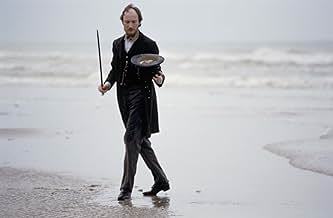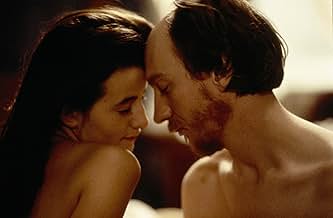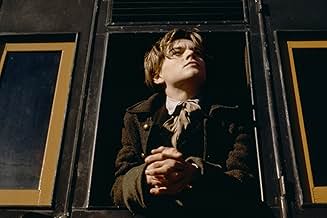Young, wild poet Arthur Rimbaud and his mentor Paul Verlaine engage in a fierce, forbidden romance while feeling the effects of a hellish artistic lifestyle.Young, wild poet Arthur Rimbaud and his mentor Paul Verlaine engage in a fierce, forbidden romance while feeling the effects of a hellish artistic lifestyle.Young, wild poet Arthur Rimbaud and his mentor Paul Verlaine engage in a fierce, forbidden romance while feeling the effects of a hellish artistic lifestyle.
- Director
- Writer
- Stars
- Awards
- 1 win & 1 nomination total
Félicie Pasotti
- Isabelle, as a child
- (as Felicie Pasotti Cabarbaye)
James Thierrée
- Frederic
- (as James Thiérrée)
Aza Declercq
- Prostitute
- (uncredited)
- Director
- Writer
- All cast & crew
- Production, box office & more at IMDbPro
Featured reviews
6B24
Genius is by nature sui generis. Most of us can only observe and wonder, and from time to time pretend we are similarly gifted. As for the actual behavior of genius, it almost always entails what is commonly known as bad manners.
The other striking feature of genius, for some but not all, is what is commonly known as insanity. Although modern science has defined various types of mental disorder and found causes and cures for some of them, it really begs the question to try to judge character or morality on the basis of scientific data. Art lies after all outside the realm of science, and always will do.
Having said that, I believe the film Total Eclipse must be reviewed or criticized solely on whether it is a good work of art. My opinion is that it succeeds at some levels, and fails at others.
I accept that the writer and director knew exactly what they were doing at every step. Except for a few quibbles about editing, I agree that the artistic concept and the technique are first rate. The musical score is excellent. The camera angles are generally adept at conveying the actions and emotions of the cast. Outdoor scenes tend to be well conceived.
Unfortunately, all that falls by the wayside because of flaws in relating the story accurately and well to its origins. Anyone familiar with the lives and work of Verlaine and Rimbaud can only cringe at the superficiality of this film. As many others have pointed out, scant attention is paid to verse, and then only in a language -- English -- that only approximates the original. It would have been a graceful beginning to make this film in France with French characters speaking French, then allowing the subtitles to fill in the gaps for non-French-speaking viewers.
What that conclusion implies, of course, is that the primary cast is wrong for this film. I really hate to say that, because DiCaprio and Thewlis are great actors doing the best they can to carry the film forward. Although I would have picked a different physical specimen for the role of Verlaine (for some odd reason the face of the late German director Fassbinder comes to mind), the choice of an androgyne for Rimbaud was physically right on target.
Finally, I am appalled at some of the comments here that betray a preoccupation with sex. "Zany" is the only word one can apply to subjective and even judgmental interpretations of this film about this or that scene or bit of action not in accord with a viewer's personal sexual expectations. My own view is that this was, if anything, a highly bowdlerized adaptation of reality.
In short, recast this in French, and focus more on the full text of Rimbaud's genius.
The other striking feature of genius, for some but not all, is what is commonly known as insanity. Although modern science has defined various types of mental disorder and found causes and cures for some of them, it really begs the question to try to judge character or morality on the basis of scientific data. Art lies after all outside the realm of science, and always will do.
Having said that, I believe the film Total Eclipse must be reviewed or criticized solely on whether it is a good work of art. My opinion is that it succeeds at some levels, and fails at others.
I accept that the writer and director knew exactly what they were doing at every step. Except for a few quibbles about editing, I agree that the artistic concept and the technique are first rate. The musical score is excellent. The camera angles are generally adept at conveying the actions and emotions of the cast. Outdoor scenes tend to be well conceived.
Unfortunately, all that falls by the wayside because of flaws in relating the story accurately and well to its origins. Anyone familiar with the lives and work of Verlaine and Rimbaud can only cringe at the superficiality of this film. As many others have pointed out, scant attention is paid to verse, and then only in a language -- English -- that only approximates the original. It would have been a graceful beginning to make this film in France with French characters speaking French, then allowing the subtitles to fill in the gaps for non-French-speaking viewers.
What that conclusion implies, of course, is that the primary cast is wrong for this film. I really hate to say that, because DiCaprio and Thewlis are great actors doing the best they can to carry the film forward. Although I would have picked a different physical specimen for the role of Verlaine (for some odd reason the face of the late German director Fassbinder comes to mind), the choice of an androgyne for Rimbaud was physically right on target.
Finally, I am appalled at some of the comments here that betray a preoccupation with sex. "Zany" is the only word one can apply to subjective and even judgmental interpretations of this film about this or that scene or bit of action not in accord with a viewer's personal sexual expectations. My own view is that this was, if anything, a highly bowdlerized adaptation of reality.
In short, recast this in French, and focus more on the full text of Rimbaud's genius.
Total Eclipse is the story of the relationship between two men who definitely made their mark on French literature. Poets Paul Verlaine and Arthur Rimbaud have been compared to Oscar Wilde and Lord Alfred Douglas, but aside from being gay the pairs have little in common. Wilde is a universally recognized talent who had the misfortune to fall in love with a spoiled young aristocrat in Douglas who had some pretenses to literary talent. Douglas was spoiled, but both he and Wilde conducted themselves well in public.
Verlaine and Rimbaud were a pair of talented louts as Total Eclipse shows us in graphic detail. Wilde married for convention's sake at the time and did have two sons and was a loving husband. His is a Victorian Brokeback Mountain story. Verlaine was a drunk and an abusive husband who regularly beat on his wife and child who was totally fascinated by young Rimbaud. He was ten years older than Rimbaud in real life, the film does make him seem a great deal older. He did read some of Rimbaud's work as a teenage prodigy and sent for the country lad. You can feel sorry for Wilde and do in the films that tell his story. Verlaine as played by David Thewlis is a really hateful person, gay audiences can't work up any sympathy for him.
However Rimbaud as played by Leonardo DiCaprio by look and talent makes you perfectly understand why Rimbaud became so obsessed with him. Verlaine was a political man, he was a supporter of the Paris Commune and was in fear of the police who would have loved to nail him on a morals charge if not on a political one. Rimbaud didn't have a political opinion in the world, he was a peasant kid from the Ardennes who partied hardy, drove Verlaine crazy and jealous, but both learned and fed off each other artistically. I found it interesting that Rimbaud and Verlaine flee to Great Britain of all places to be freer, the same place that in the next generation would persecute poor Oscar Wilde.
DiCaprio and Thewlis play a couple of louts, but a fascinating pair of louts. Total Eclipse has both these guys eclipsing the supporting cast around them, that probably is the main weakness of the film. Still fans of both men shouldn't miss this film.
Verlaine and Rimbaud were a pair of talented louts as Total Eclipse shows us in graphic detail. Wilde married for convention's sake at the time and did have two sons and was a loving husband. His is a Victorian Brokeback Mountain story. Verlaine was a drunk and an abusive husband who regularly beat on his wife and child who was totally fascinated by young Rimbaud. He was ten years older than Rimbaud in real life, the film does make him seem a great deal older. He did read some of Rimbaud's work as a teenage prodigy and sent for the country lad. You can feel sorry for Wilde and do in the films that tell his story. Verlaine as played by David Thewlis is a really hateful person, gay audiences can't work up any sympathy for him.
However Rimbaud as played by Leonardo DiCaprio by look and talent makes you perfectly understand why Rimbaud became so obsessed with him. Verlaine was a political man, he was a supporter of the Paris Commune and was in fear of the police who would have loved to nail him on a morals charge if not on a political one. Rimbaud didn't have a political opinion in the world, he was a peasant kid from the Ardennes who partied hardy, drove Verlaine crazy and jealous, but both learned and fed off each other artistically. I found it interesting that Rimbaud and Verlaine flee to Great Britain of all places to be freer, the same place that in the next generation would persecute poor Oscar Wilde.
DiCaprio and Thewlis play a couple of louts, but a fascinating pair of louts. Total Eclipse has both these guys eclipsing the supporting cast around them, that probably is the main weakness of the film. Still fans of both men shouldn't miss this film.
This art-house film is not a crowd-pleaser but is nevertheless an excellent film. It is one of DiCaprio's best independent films before he became a titanic superstar.
Rimbaud"s painfully self-destructive bisexual life and his affair with Verlaine is not a "nice" story to tell, but the drama is interesting as a study in the eccentric mind of the artist. Beneath the plot is the age-old question of whether the artist's oddness hinders his creativity or is actually the fuel for his art.
Rimbaud"s painfully self-destructive bisexual life and his affair with Verlaine is not a "nice" story to tell, but the drama is interesting as a study in the eccentric mind of the artist. Beneath the plot is the age-old question of whether the artist's oddness hinders his creativity or is actually the fuel for his art.
Of course there is pain and monstrosity in love. Two wild poets would need to live that out. But can a movie about it make any sense, without a fair portion of their poetry?
Michelangelo said that painting excels when it approaches sculpture, and sculpture when it comes close to relief. An art form is enhanced when nearing its periphery, almost turning into another art form. Along this line, I am sure that the poetry of Rimbaud and Verlaine would have stood forward excellently, when recited in the movie about their relation. It would also have helped in making their interactions understandable.
After seeing the movie a second time, I read some of Rimbaud's writings, and there was a slightly different character emerging from his words, than the one portrayed, though excellently, by Leonardo DiCaprio. Rimbaud's own words show that he was a victim just as much as a predator. Of course, he would say so, himself, but also: this modification would have made the movie rise beyond the black and white polarity it is too often caught in.
Still, I enjoyed the movie tremendously, mostly thanks to Leo and the way he made his character fire up. He might have been type-cast, to do the obnoxious adolescent, but they got more than they bargained for - he included the most important aspect of Rimbaud: the prodigy poet, the artist living for art, loving for art.
His acting is sometimes stunning, and not only in delicate scenes where minute nuances are essential, but also in all kinds of silliness in between. To hear him bark like a dog, really like a dog - did he do that himself, or was there an added sound effect? The pause, and the slightly humorous expression on his face, right before he tells his fellow poet that he expects more from him than his words. His posture and cocky moving about in the Paris of the noble poets, and his running on all four in the countryside. Brilliant acting.
There's a lot of formidable acting also on behalf of the others in the cast, even when the script and the direction works against them. And it does, more than once. Maybe the plot got all confused, simply because the poetry of the poets was not taken into account.
But a film gone awry can still be a wonderful experience. Frustrating, but wonderful. This one is.
Michelangelo said that painting excels when it approaches sculpture, and sculpture when it comes close to relief. An art form is enhanced when nearing its periphery, almost turning into another art form. Along this line, I am sure that the poetry of Rimbaud and Verlaine would have stood forward excellently, when recited in the movie about their relation. It would also have helped in making their interactions understandable.
After seeing the movie a second time, I read some of Rimbaud's writings, and there was a slightly different character emerging from his words, than the one portrayed, though excellently, by Leonardo DiCaprio. Rimbaud's own words show that he was a victim just as much as a predator. Of course, he would say so, himself, but also: this modification would have made the movie rise beyond the black and white polarity it is too often caught in.
Still, I enjoyed the movie tremendously, mostly thanks to Leo and the way he made his character fire up. He might have been type-cast, to do the obnoxious adolescent, but they got more than they bargained for - he included the most important aspect of Rimbaud: the prodigy poet, the artist living for art, loving for art.
His acting is sometimes stunning, and not only in delicate scenes where minute nuances are essential, but also in all kinds of silliness in between. To hear him bark like a dog, really like a dog - did he do that himself, or was there an added sound effect? The pause, and the slightly humorous expression on his face, right before he tells his fellow poet that he expects more from him than his words. His posture and cocky moving about in the Paris of the noble poets, and his running on all four in the countryside. Brilliant acting.
There's a lot of formidable acting also on behalf of the others in the cast, even when the script and the direction works against them. And it does, more than once. Maybe the plot got all confused, simply because the poetry of the poets was not taken into account.
But a film gone awry can still be a wonderful experience. Frustrating, but wonderful. This one is.
Arthur Rimbaud was famous for what? For changing the face of French and possibly all modern poetry. At the age of 17. Do we see any of this in the movie? No. We have a director who thinks that being gay was Rimbaud's muse. All through the film, I kept wondering, "when are they going to let him read his poetry, and show us WHY it was important, HOW it contrasted with conventional poetry at the time?" I mean, if you're brave enough to try to sell graphic homosexual scenes to a Merchant Ivory audience, then why not be brave enough to "bore" us with some literary analysis?
Did you know
- TriviaOuzo was used as a replacement for absinthe for the drinking scenes filmed on the first day. Because the scene turned out so well, method drinking was adopted for the rest of filming. As a result, Thewlis had admitted in a interview that he can't really remember making the film at all.
- GoofsIn the Café Andre where the adult Isabelle Rimbaud meets with Paul Verlaine, the typeface on the window is clearly in Helvetica, a typeface that was not created until 1954.
- Quotes
[last lines]
Arthur Rimbaud: I've found it. What? Eternity. It's the sun mingled with the sea.
- SoundtracksArrival
Composed by Hank Deckon and Jan A.P. Kaczmarek
Performed by Warsaw Symphony Orchestra and Wilanow String Quartet
Conductor [Warsaw Symphony] Krzesimir Debski
- How long is Total Eclipse?Powered by Alexa
Details
- Release date
- Countries of origin
- Language
- Also known as
- Eclipse totale
- Filming locations
- Production companies
- See more company credits at IMDbPro
Box office
- Budget
- $8,000,000 (estimated)
- Gross US & Canada
- $340,139
- Opening weekend US & Canada
- $131,269
- Nov 5, 1995
- Gross worldwide
- $340,139
Contribute to this page
Suggest an edit or add missing content



















